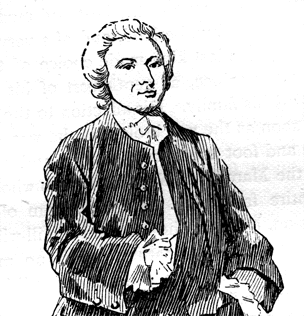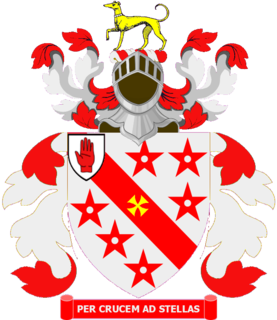See also
| This disambiguation page lists articles about people with the same name. If an internal link led you here, you may wish to change the link to point directly to the intended article. |
Thomas Widdrington (died 1664) was an English politician and judge.
Thomas Widdrington may also refer to:
| This disambiguation page lists articles about people with the same name. If an internal link led you here, you may wish to change the link to point directly to the intended article. |

John Rushworth was an English lawyer, historian and politician who sat in the House of Commons at various times between 1657 and 1685. He compiled a series of works covering the English Civil Wars throughout the 17th century called Historical Collections and also known as the Rushworth Papers.
The Regius Professorship of Greek is one of the oldest professorships at the University of Cambridge. The Regius Professor chair was founded by Henry VIII in 1540 with a stipend of £40 per year, subsequently increased in 1848 by a canonry of Ely Cathedral.
This is a list of people who have served as Lord Lieutenant of Durham.
Thomas Hickman-Windsor, 1st Earl of Plymouth, PC was the son of Dixie Hickman and his wife Elizabeth Windsor, sister and heiress of Thomas, 6th Baron Windsor. He assumed the additional surname of Windsor and succeeded to the Windsor family's estate around Hewell Grange near Redditch in 1645. The same year he distinguished himself in the Battle of Naseby. Hickman-Windsor impressed King Charles I by relieving his garrison at High Ercall.
William Widdrington, 1st Baron Widdrington was an English landowner and politician who sat in the House of Commons from 1640 to 1642 and was created a peer in 1643. He fought in the Royalist army in the English Civil War and was killed in battle in 1651.
This is a list of people who have served as Custos Rotulorum of Northumberland.

Baron Widdrington, of Blankney in the County of Lincoln, was a title in the Peerage of England. It was created on 2 November 1643 for Sir William Widdrington, 1st Baronet. He had already been created a baronet, of Widdrington in the County of Northumberland, in the Baronetage of England on 9 July 1642. The Widdringtons were an ancient Northumbrian family who gave their name to the village, near Morpeth, Northumberland. In the 17th century the family were strongly Royalist. William Widdrington, 4th Baron Widdrington, joined Derwentwater and other Northumberland families in the Jacobite rising of 1715 and was captured at the Battle of Preston (1715). As a consequence of the subsequent attainder of the brothers, the Widdrington estates were sequestered and sold by the Crown, and the title was forfeited. Of their three great houses no traces now remain: Widdrington Castle was demolished in 1862 ; Stella Hall, Blaydon on Tyne, was demolished in 1954; and Blankney Hall, Lincolnshire suffered the same fate in 1960. Some of the family paintings passed to the Cook/Widdrington family of Newton Hall, and those were auctioned by Christie’s in 2010. The important collection of family portraits passed into the possession of the Towneley family through Mary Widdrington, daughter of the third Baron. These were sold at various auctions after Towneley Hall was emptied in about 1902. A few have since been donated to Towneley Hall, and four were donated to Stonyhurst College in the 19th Century.
Thomas Widdrington is an English former footballer and football manager, who is head of recruitment at Bristol Rovers.
Widdrington is a surname, and may refer to:

Sir Thomas Widdrington SL was an English judge and politician who sat in the House of Commons at various times between 1640 and 1664. He was speaker of the House of Commons in 1656.
Ralph Widdrington was Regius Professor of Greek at Cambridge University.
Thomas Preston was an English Benedictine monk serving as one of the leaders of the mission to re-establish the Benedictine Order in England after the closure of monasteries during the 16th century. He is also remembered for his writings upholding the cause of James I of England in the allegiance oath controversy.

Sir John Legard, 1st Baronet, of Ganton in Yorkshire, was an English landowner and Member of Parliament.
There have been three baronetcies created for members of the Widdrington family, one in the Baronetage of Nova Scotia and two in the Baronetage of England. All three creations are extinct. The Widdringtons were an ancient Northumbrian family who gave their name to the village, near Morpeth, Northumberland. In the 17th century the family were strongly Royalist and were rewarded with one baronetcy in the Baronetage of Nova Scotia and two in the Baronetage of England. William Widdrington was created a baronet, of Widdrington in the County of Northumberland, in the Baronetage of England on 9 July 1642. For more information on this creation, see Baron Widdrington. His cousin Edward Widdrington was created a Baronet, of Widdrington in the County of Northumberland, in the Baronetage of Nova Scotia on 26 September 1635, and a Baronet, of Cartington in the County of Northumberland, in the Baronetage of England, on 8 August 1642. The Nova Scotia baronetcy became either extinct or dormant on his death in 1671 while the English baronetcy became extinct.
Sir Roger Jaques was an English merchant and politician who sat in the House of Commons in 1640.<
Thomas Widdrington was an English politician who sat in the House of Commons in 1660.
Sir Robert Markham, 2nd Baronet was an English politician who sat in the House of Commons from 1678 to 1685.
Charles Fairfax, 5th Viscount Fairfax of Emley, was an English peer.
Sir Charles Wheler, 2nd Baronet of Birdingbury, Warwickshire, was an English cavalry officer who served in the English and Spanish armies. In 1667 he was elected a Member of Parliament for constituency of Cambridge University.